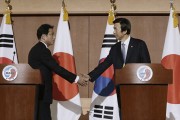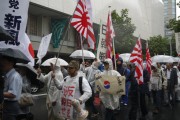
Could this be the end of historical dispute and regional difference that so often threatens peace in East Asia? We hope so. Over the past weekend, the annual China-Japan-South Korea Trilateral Summit meeting took place at the Great Hall of the People in Beijing in which a number of key issues including regional security, economic cooperation, environmental pollution affecting the East Asian block as a whole were discussed between South Korea’s President Lee Myung-bak, China’s Premier Wen Jiabao, and Japan’s Prime Minister Noda Yoshihiko. Pressing issues at hand, such as the North Korean missile threat, global financial instability, persisting territorial and EEZ disputes were on the table, but the most prominent item on the agenda was the initiation of the trilateral free trade talk. The three leaders agreed to launch the trilateral FTA negotiation within this year.
With the bilateral trade agreement sailing ahead between South Korea and China, which is already very close to reaching an agreement over the Sensitive Items being enumerated, it was reported that Japanese Prime Minister Noda called for an ad hoc meeting on Sunday to address the wide array of the North Korean security threats that includes border refugee issues. However, the agreement over the stability of North Korea was not included due to the Chinese opposition. Wen however expressed that “the pressing task is to do our utmost to prevent tensions on the Korean peninsula from escalating.”
The joint declaration issued on the 13th included the effort to build greater political trust, deepen economic and trade cooperation and encourage sustainable development between the three countries. Xinhua reported that the three leaders also agreed to a three-way investment treaty – one stepping stone to the bigger and much more contentious goal of a free trade deal.
An article from Hankook Ilbo reported that South Korea has adopted the track-two approach, with the focus on greater economic cooperation with China on the one hand, and the security cooperation with Japan on the other hand. South Korea has reportedly demanded a level of trade liberalization higher than the normal WTO-level agreement, to a level similar or higher than CEPA (Mainland and Hong Kong Closer Economic Partnership Arrangement) existant between China and Hong Kong. In an interview with CCTV, President Lee Myung-bak expressed that once the selection of the Highly-Sensitive Items are agreed and out of the way, the negotiation should be concluded within 2 years.
China is the biggest trade partner of both Japan and South Korea. A free trade treaty could lift China’s GDP by up to 2.9 percent, Japan’s by 0.5 percent, and South Korea’s by 3.1 percent, Xinhua said, without citing the basis for its estimates. “China is simply a huge market,” said Noda, according to the Wall Street Journal. “That’s all there is to it.”
From Daum:
Becoming the first country to tap into the 1.3 billion market… Chips all-in for South Korea
South Korea has begun the official Free-Trade Agreement (FTA) negotiation with China, 7 year after the initial joint feasibility study with China.
On 2nd of May, South Korea and China have announced the start of negotiation for FTA, 7 year after the Joint Feasibility Study between South Korea and China. South Korean trade minister Park Tae-ho issued a joint-statement with Chen Deming, the head of the Chinese Ministry of Commerce, announcing the ‘historic beginning of the bilateral negotiation between the two.’ However, there was no mention of the set-date by which to finalize the agreement. South Korean government does not plan to hurry the process. Minister Chen, on the other hand, expressed his personal desire to ‘conclude the agreement within 2 years’.
If South Korea signs the FTA with China, it would be the only country in Asia to have signed bilateral agreements with all three major economic zones (USA, China, EU). South Korea’s world-market access would reach 66.7% of the global GDP, becoming the second in the world.
‘FTA Hub’ strategy will also receive momentum. The bilateral agreement between South Korea and China is expected to create further synergy effect with the existing FTA with EU and USA. This move is also expected to jump-start the bilateral agreement with Japan. The companies wanting to gain access to the Chinese domestic market or the Chinese firms trying to gain entry into EU or American market will be attracted to open up branches in South Korea. When all factors are considered, the growth of real GDP in 10 years time is 2.28~3.04% according to the projection by Korean Institute of International Economic Policy (KIEP). In terms of labor market effect, it is estimated that 2,400,000~3,300,000 new jobs will be created. The origin of the ‘FTA Hub’ policy was the Roh administration. The director general of the bilateral trade negotiation Mr. Kim Hyun-jong had previously expressed the moment of this agreement as a leverage with which to sign South-North
However, the prospect of bilateral agreement with China is deeply troubling for some. Mr. Oh Dong-yun, a researcher at Medium-sized Firm Research Institute wrote ‘to the national economy as a whole it is a gain but to some segments it will cause quite a havoc.’
The resistance from the agriculture and fisheries is stiffer than ever before. According to the Korean Agricultural Economy Research Institute, once the bilateral agreement with China is in effect, the agricultural import from China will grow by $108 million USD and the agricultural produce is expected to drop by 14.7%. The fisheries is even more resistant. The Fisheries Co-operations senior researcher Mr. Kim Hyun-yong reported ‘[W]e share the common fishing seas and Tongyong and Shandong Province and there is virtually no lag in distribution-time between us and China. With the bilateral agreement, our primary sector will completely collapse.’
The Two-Phase negotiation is reflective of the sensitivities acknowledged by the both governments. Both governments select a list of ‘Sensitive Items (SI)’ and only then could the negotiation move on to the second phase, a procedure previously never tried. Among the SI the High-Sensitive Items (HSI) will be removed from the negotiation. Rice is off the negotiation table. ‘Normal-Sensitive Items’ will enjoy tariff protection of 10 years after which it will be partially or completely lifted. What gets included and by how much will be decided in the first phase of the negotiation which is set to start at the end of this month. The director general Mr. Park said this would include not only the goods from ‘agriculture and fisheries but also some manufacturing and service sectors.’
Both governments also agreed not to apply tariff to the manufactured goods from the offshore processing zone (OPZ). Mr. Choi explained that this means ‘[W]hatever gets produced in Kaesong and other OPZs in North Korea also will be non-tariffed, adding that this move ‘would contribute to the peace and stability in the Korean peninsular and create an environment that encourages North Korea to open for reform.’
The bilateral agreement gained traction when president Lee Myung-bak and Hu Jintao met for a bilateral summit discussion in January 9, 2012. As China oriented its economic policy to more domestic market, South Korea, until then passive, changed to aggressive stance to gain upper-hand in the Chinese domestic market entry.
Comments from Daum:
대피소:
The bilateral agreement was initiated by China, why? Why does China want it first? This shows that China desperately wants to counter the US-led Asian economic sphere with their own economic sphere. So Korea, regardless of it wants or not, will have to side with China and weaken the alliance with the US, thereby increasing the security threat. Also through the FTA, China will flood our country with their migrant farmers and hurt our agricultural industry. This will harm everyone except Chaebol in South Korea.
밤송:
FTA is nice, but the cheating Chinese – that is the problem.
쥐쉐뀌능지처참할:
Is FTA panacea? Tariff reduction through FTA will result in automatic price reduction in consumer goods…? So where will we get the decreased tax revenue from removal of tariff? Will consumers actually benefit from the reduced price of the goods?? Morons… You honestly think that the reduction in the cost of production will leave more money in your pocket? This is the typical chicanery [cho-sam-mo-sa ‘조삼모사’ –– see below]… Lower the tariff and reduce the goods price, but increase the indirect tax to make up for the lost tariff revenue… Not to mention that the goods price do not ACTUALLY decrease in the first place…
Translators note: [cho-sam-mo-sa ‘조삼모사’ – an ancient Chinese proverb from the Song dynasty. A monkey cage keeper was ordered to reduce the amount of feed. He initially gave three acorns for the morning and four in the evening, causing much anger. When he fed them four acorns in the morning and three in evening instead, the monkeys did not realize it was exactly the same amount and were content in their stupidity. It satirizes the inability of the general public to discern what is obvious political trickery. An online parody was a hit in late 2006, the updated proverb highlighted a more spinless survivalist attitude common now, in the face of unavoidable reality.
우루사:
Not sure if it is a good thing or bad thing, but China certainly seems very eager and willing…
mongni:
If this goes through, the agricultural and manufacturing sector are over~~~~~ Korea will be absorbed into China~~~~
린스요정:
Why do you think Japan of all countries are NOT doing FTA with China?
2GB:
Suuuuuuch a brazen BS….. Take the SOFA…? Get the fuck out of here… We must not do FTA, and above all not under this administration….
불고기:
I want to love China. But there is nothing on the Korean media that makes me want to love China. What do I need to do to love China……? This news does not make things any easier for me to love.
joylife2:
As soon as we sign this, there will be a liberalization of labor market, and the Korean folks will be swept away by the sea of 짱께. That will be world-apart from the number tolerated by the current multicultural policy. I hear rumors about 10 million Chinks flooding in. This FTA is not exactly for commoners for sure.
염장지르기:
Whatever happened to all those protesters against the FTA with America!
작은거인
Those who cannot compete with the Chinese must not be bailed out but leave them to their own device. Why must we protect the weak industry preying on us consumers behind our protective barrier? Do not ever bail them out with tax money, let them fall and collapse if they cannot survive on their own. No market intervention, we taxpayers are not last resort for your incompetency.
seal
Sigh~ There is no answer. Immigration is the only answer?
K2저격수
Whatever you do, don’t open up the labor market.
MB는개말종
MB seems sorry that he was able to sell us out to only America and Japan and now he does this to make up to China… He is so eager to sell us out…
derouasjk
If we sign this deal, we may as well sign our sovereignty away huh huh huh Especially, labor market-illegal aliens-no visa entry issues cannot be ignored in this tiny little country… The illegal alien issue is already bad enough as it is, so what do you think will happen when we sign on to the FTA with China? ke ke ke In 10 years time we will lose control of our own land ke ke ke Think carefully about the outcome… huh huh huh
따스한햇살
Hey Rat [referring to the president], have you thought about 1.3 billion pushing INTO our market???
그때가좋았지
Why do we always assume that we will end up top?? Could the opposite not happen? In 5 years… I would think that Haier electronics may catch us up in 10 years other than the key competitive goods…. We have near monopoly over automobile market in domestic, but China will be able to erode our market lead with their low-price strategy. Of course their goods are inferior to ours but they are catching up to us in incredible speed…. very alarming.
민들레18번가
I am against this. We did fine without it until now~ If one gets too greedy, one is bound to choke~ And especially under this administration~
못난거들
Whatever you say about everything else, the Chinese agricultural goods will wipe out the Korean agricultural industry.. This is for certain.








